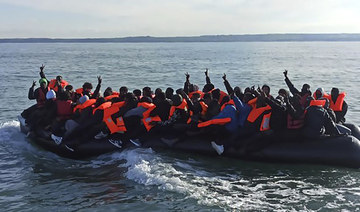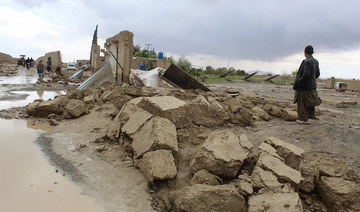It’s whispered in NATO meeting rooms and celebrated in China’s halls of power. It’s lamented in the capital cities of key US allies and welcomed in the Kremlin.
Three years into Donald Trump’s presidency, America’s global influence is waning. In interviews with The Associated Press, diplomats, foreign officials, and scholars from numerous countries describe a changing world order in which the United States has less of a central role.
And in many ways, that’s just fine with the White House. Trump campaigned on an “America First” foreign policy and says the strong United States will mean a stronger world.
“The future doesn’t belong to globalists,” Trump told the UN General Assembly in September. “The future belongs to patriots.”
Trump insists he’s abandoning globalism for bilateral ties more beneficial to the US.
But there’s little sign of that.
Instead, once-close allies — France, Egypt, Pakistan, Afghanistan, Mexico, Turkey, Germany and more — have quietly edged away from Washington over the past three years.
Sometimes it’s not so quiet.
In a Buckingham Palace reception room during the recent NATO summit, a TV camera caught a cluster of European leaders grinning as Canadian Prime Minister Justin Trudeau appeared to mock Trump.
“You just watched his team’s jaws drop to the floor,” Trudeau said, apparently speaking about his meeting with Trump, talking to a group that included the leaders of France, Britain and the Netherlands.
Trudeau quickly tried to walk back his words, telling reporters that he and Trump have a “good and constructive relationship.” But the footage brought into the open the increasing divide between the United States and its allies.
This is a major change. For generations, America saw itself as the center of the world. For better or worse, most of the rest of the world has regarded the US as its colossus — respecting it, fearing it, turning to it for answers.
“We are America,” said Madeleine Albright, secretary of state in the Clinton administration. “We are the indispensable nation.”
To be sure, America is still a global superpower. But now, the country’s waning influence is profoundly redrawing the geopolitical map, opening the way for Washington’s two most powerful foes — Russia and China — to extend their reach into many countries where they had long been seen with suspicion.
Because of those longtime friends of Washington? Many are now looking elsewhere for alliances. Very often, they look to China or Russia.
In Islamabad, for example, where the US was once seen as the only game in town, Pakistan’s government now gets military aid and training from Russia and billions of dollars in investment and loans from China. In the Philippines, President Rodrigo Duterte is nurturing closer ties to Beijing despite his nervousness over its expansionism in the South China Sea. In Egypt, long one of America’s closest Middle Eastern allies, Cairo now lets Russian military planes use its bases and the two countries recently held joint air force exercises. In Ukraine, which has looked to US military aid for years to try to keep an expansionist Russia in check, Trump’s questionable loyalty is seen as creating a dangerous vacuum.
“Once the US role in Europe weakens, Russia’s influence inevitably grows,” Vadim Karasev, head of the Kyiv-based Institute of Global Strategies said.
Or there’s France, whose friendship with America goes back to the days of George Washington. Perhaps more than any other Western leader, French President Emmanuel Macron has made clear that Europe should look to Beijing, not Washington, when it comes to addressing global issues from trade wars to Iran’s nuclear ambitions. Macron’s recent trip to China was choreographed in part to convey that the European Union has little faith in Washington anymore.
Europe is on “the edge of a precipice,” Macron told The Economist magazine in a recent interview. “What we are currently experiencing is the brain death of NATO,” he said, a reference to the announced US withdrawal from northern Syria.
Perhaps no US ally is more worried than the Kurds, America’s longtime battlefield allies. They bore the brunt of the combat as the Daesh group was driven from the territory it held across a swath of Iraq and Syria.
“Betrayal process is officially complete,” a Kurdish official said in a WhatsApp message sent to journalists after Trump’s defense secretary announced US troops would fully withdraw from northeastern Syria. That pullout paved the way for a Turkish offensive against Kurdish fighters and signaled to the world that the US may no longer be as reliable as it once was.
The Kurds weren’t taken completely by surprise. Kurdish officials had been holding back-channel talks with Syria and Russia for more than a year before the announcement. The Kurds feared they would be abandoned by Washington.
China has been delighted by what it sees as the voluntary abdication of US leadership, particularly on free trade and climate change.
Trump’s pullout from the planned Trans-Pacific Partnership, for example, opened the way for Beijing to push ahead with its own alternative free-trade agreement.
Meanwhile, China has gone from being a climate change curmudgeon to sometimes reaping praise as a global leader on the issue.
The White House’s National Security Council did not respond to requests for comment about this story.
Trump insists he is not pulling the US off the world stage. He cites partnerships with other nations to fight terrorism and his administration highlights a recent high-profile raid in Syria that killed the leader of the Daesh group.
Trump has successfully coaxed NATO allies to spend billions more on their own defense to lessen the burden on the US He complains that America should not be the world’s policeman or its piggy bank, and needs to get out of what he calls “endless wars.”
Some former administration officials have cited Trump’s business background to describe him as having a “transactional” approach to foreign policy. He has pulled out of multilateral agreements, such as the Iran nuclear deal, yet he needs international support to pressure Tehran for its regional aggression and nuclear program. He gets credit for opening dialogues with the Afghan Taliban and North Korea, although efforts to end America’s longest war and get Kim Jong Un to give up his nuclear weapons have so far been unsuccessful.
He also has set about negotiating bilateral trade agreements with many countries because he says deals made by previous administrations were unfair to the US He had success with South Korea, yet has not yet sealed a deal with China.
In some ways, Washington’s declining influence is simply a reflection of history: America is no longer the singular economic and military giant that overshadowed nearly every other nation.
In 1945, America had the world’s only nuclear weapons and produced roughly half the world’s gross domestic product. Today, the US has perhaps 15 percent of global GDP and even North Korea has nuclear weapons. Other countries have grown immensely. China, once a poverty-battered behemoth, has become a financial giant and an emerging superpower. Countries from Brazil to India to South Korea have become serious regional powers.
But if history plays a role, the diplomatic shifts of the Trump years are more about a White House unapologetically focused on the US
Globalism was once one of Washington’s few unifying themes. Now, it’s an insult in the capital, and the US gets more attention for rejecting multilateral agreements, from Trump pulling out of the Asia-Pacific deal to his rejection of the Paris climate accords. The president has hosted only two state dinners and has repeatedly sought to slash the State Department budget.
Trump insists talk of American decline is nonsense.
“The Fake News Media is doing everything possible to belittle my VERY successful trip to London for NATO,” Trump tweeted after the summit, adding that there was “only deep respect” for the United States.
America still has enormous power.
A 2018 Pew Research Center survey done across 25 countries found that only 25 percent of people believed the US plays a less important role now than it did a decade ago.
Another of the survey’s findings: People in nearly every country said they preferred a world order led by the United States.
America’s influence, once so dominant, waning under Trump
America’s influence, once so dominant, waning under Trump
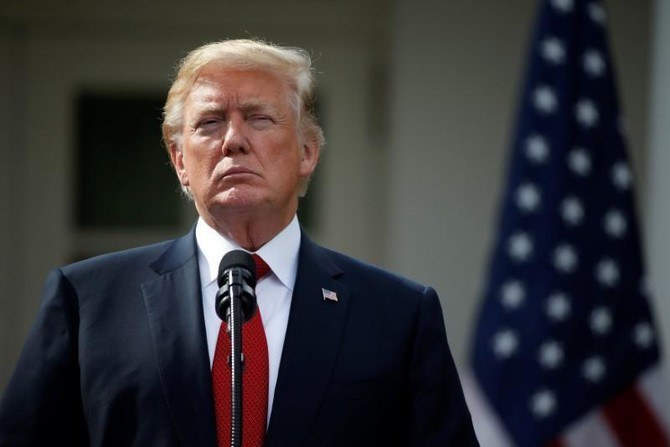
- Trump insists abandoning globalism for bilateral ties more beneficial to the US
- Once-close allies including France, Egypt, Pakistan and Afghanistan, have quietly edged away from Washington over the past three years
Macron blasts ‘ineffective’ UK Rwanda deportation law
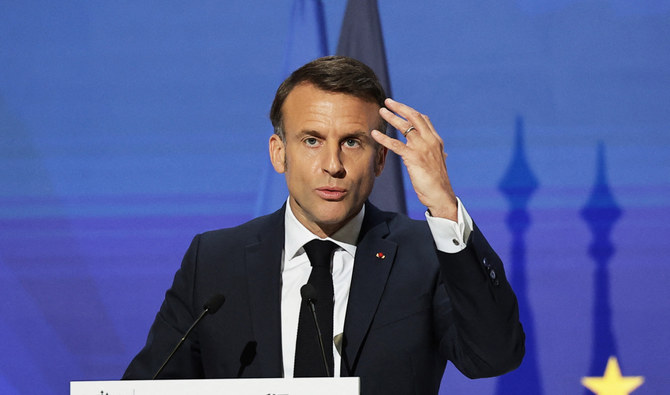
PARIS: French President Emmanuel Macron on Thursday said Britain’s plan to send asylum seekers to Rwanda was “ineffective” and showed “cynicism” while praising the two countries’ cooperation on defense.
“I don’t believe in the model ... which would involve finding third countries on the African continent or elsewhere where we’d send people who arrive on our soil illegally, who don’t come from these countries,” Macron said.
“We’re creating a geopolitics of cynicism which betrays our values and will build new dependencies, and which will prove completely ineffective,” he added in a wide-ranging speech on the future of the European Union at Paris’ Sorbonne University.
British MPs on Tuesday passed a law providing for undocumented asylum seekers to be sent to Rwanda, where their asylum claims would be processed and where they would stay if the claims succeed.
The law is a flagship policy for Prime Minister Rishi Sunak’s government, which badly lags the opposition Labour Party in the polls, with an election expected within months.
Britain pays Paris to support policing of France’s northern coast, which aims to prevent migrants from setting off for perilous crossings in small boats.
Five people, including one child, were killed in an attempted crossing Tuesday, bringing the toll on the route so far this year to 15 — already higher than the 12 deaths in 2023.
But Macron had warm words for London when he praised the two NATO allies’ bilateral military cooperation, which endured through the contentious years of Britain’s departure from the EU.
“The British are deep natural allies (for France), and the treaties that bind us together ... lay a solid foundation,” he said.
“We have to follow them up and strengthen them because Brexit has not affected this relationship,” Macron added.
The president also said France should seek similar “partnerships” with fellow EU members.
US alarmed by signs of ‘imminent military offensive’ in Darfur

WASHINGTON: The US has warned of a looming rebel military offensive on the Sudanese city of El-Fasher. This humanitarian hub appears to be at the center of a newly opening front in the country’s civil war.
After a year of fighting between the armed forces of Gen. Abdel Fattah Al-Burhan and the paramilitaries of the Rapid Support Forces, under Gen. Mohammed Hamdan Dagalo, millions have been displaced in the northeastern African country.
Until recently, El-Fasher — the last Darfur state capital not under RSF control — had been relatively unaffected by the fighting, hosting a large number of refugees.
But since mid-April, bombardments and clashes have been reported in the city and surrounding villages. The US “calls on all armed forces in Sudan to immediately cease attacks in El-Fasher,” the State Department said.
“We are alarmed by indications of an imminent offensive by the Rapid Support Forces and its affiliated militias,” it said, adding that “an offensive against El-Fasher city would subject civilians to extreme danger.”
After several days of “arbitrary shelling and airstrikes” in the city and its outskirts, a pro-democracy lawyers’ committee reported last week that at least 25 civilians had been killed.
Clashes in the eastern and northern parts of the city have already resulted in 36,000 displaced people, according to the UN’s Office for the Coordination of Humanitarian Affairs.
As the war enters its second year, the UN and US have warned the breakdown of the fragile peace in El-Fasher would be catastrophic.
The city functions as the main humanitarian hub in the vast western region of Darfur, home to around a quarter of Sudan’s 48 million people and the site of harrowing violence during this and previous conflicts.
The State Department said it had seen “credible reports” that the RSF and affiliated militias had razed multiple villages west of the city, while it condemned “reported indiscriminate aerial bombardments” in the region by Sudan’s armed forces.
Death toll in migrant boat capsize off Djibouti rises to 24: UN agency
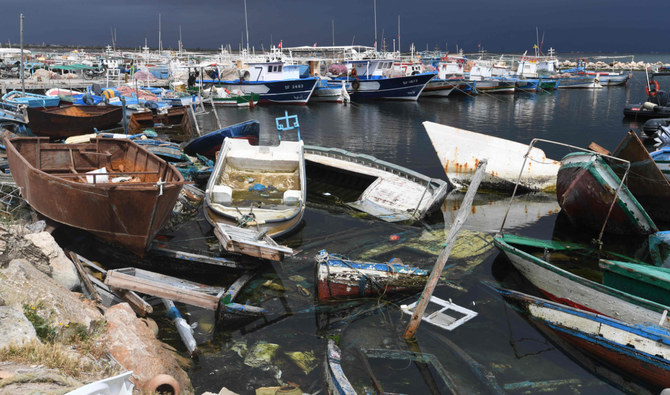
- 20 remain missing after the boat carrying at least 77 migrants, including children, capsized near the town of Obock
NAIROBI: The death toll from a migrant boat disaster off Djibouti this week has risen to 24, the UN’s migration agency said, highlighting a sharp increase in the number of people returning from Yemen to the Horn of Africa nation this year.
The capsize on Monday was the second fatal maritime accident in two weeks off Djibouti, which lies on the perilous so-called Eastern Migration Route from Africa to the Arabian Peninsula.
At least 24 people died, and 20 remain missing after the boat carrying at least 77 migrants, including children, capsized near the town of Obock, the International Organization for Migration said.
It said 33 survivors were being cared for at an IOM center in Obock and that local authorities are conducting search and rescue operations in the hope of finding more people alive.
Addis Ababa’s ambassador to Djibouti had said those on the boat were Ethiopian migrants.
Another vessel also carrying mainly Ethiopian migrants sank in the same area on April 8, with a death toll of at least 38.
“The occurrence of two such tragedies within two weeks highlights the dangers faced by children, women, and men migrating through irregular routes, underscoring the importance of establishing safe and legal pathways for migration,” IOM chief of mission in Djibouti, Tanja Pacifico, said.
The IOM said it had recorded a total of 1,350 deaths on the Eastern Route since 2014, not including this year.
In 2023 alone, it said it documented at least 698 deaths along the route, including 105 lost at sea.
The agency believed the people on both ill-fated vessels were attempting to return from Yemen to Djibouti.
Each year, tens of thousands of African migrants brave the Eastern Route across the Red Sea to reach Gulf nations, escape conflict or natural disaster, or seek better economic opportunities.
However, many are unsuccessful and “thousands are stranded in Yemen where they experience extremely harsh conditions,” the IOM said.
Since the start of 2024, the agency said 3,682 migrants have left Yemen for Djibouti, more than double the figure for the same period last year.
155 killed in Tanzania as heavy rains lash East Africa

- Kenyan president convenes emergency multi-agency meeting to respond to crisis after floods cause chaos
DAR ES SALAAM, Tanzania: At least 155 people have died in Tanzania as torrential rains linked to El Nino triggered flooding and landslides, Prime Minister Kassim Majaliwa said on Thursday.
Tanzania and other countries in East Africa — a region highly vulnerable to climate change — have been pounded by heavier than usual rainfall during the current rainy season, with dozens of deaths also reported in Kenya.
Majaliwa said the rains have affected more than 51,000 households and 200,000 people, with 155 fatalities and 236 injuries.
“The heavy El Nino rains, accompanied by strong winds, floods, and landslides in various parts of the country, have caused significant damage,” Majaliwa told parliament in Tanzania’s capital, Dodoma.
He added: “These include loss of life, destruction of crops, homes, citizens’ property, and infrastructure such as roads, bridges, and railways.”
El Nino is a naturally occurring climate pattern typically associated with increased heat worldwide, drought in some parts of the world, and heavy rains elsewhere.
It can have a devastating impact on East Africa.
In Burundi, around 96,000 people have been displaced by months of relentless rains.
In addition, about 45 people have been killed in Kenya since the start of the rainy season in March, including 13 who lost their lives in flash floods in the capital, Nairobi, this week.
Kenyan President William Ruto convened an emergency multi-agency meeting on Thursday to respond to the crisis after torrential rains triggered floods that caused chaos across the city, blocking roads and bridges and engulfing homes in slum districts.
Kenyans have been warned to stay on alert, with more heavy rains forecast across the country. Officials said people living in the most vulnerable areas would be relocated.
“The government ... will do whatever it takes, apply all the required resources in terms of money and personnel to make sure that lives are not lost and the people of Kenya are protected from this disaster,” Deputy President Rigathi Gachagua told a press briefing.
Meanwhile, the UN humanitarian response agency OCHA said in an update this week that in Somalia, the Gu (April to June) rains are intensifying, with flash floods reported since April 19.
It said four people had been reportedly killed, and at least 134 families or more than 800 people were affected or displaced across the country.
Late last year, more than 300 people died in torrential rains and floods in Kenya, Somalia, and Ethiopia just as the region was trying to recover from its worst drought in four decades that left millions of people hungry.
From October 1997 to January 1998, massive floods caused more than 6,000 deaths in five countries in the region.
In March, the UN’s World Meteorological Organization said that El Nino, which peaked in December, was one of the five strongest ever recorded.
Though the weather pattern is gradually weakening, its impact will continue over the coming months by fueling the heat trapped in the atmosphere by greenhouse gases, it said.
Therefore, the WMO said in a quarterly update that “above normal temperatures are predicted over almost all land areas between March and May.”
‘Uncommitted’ organizers will join campus protesters in Michigan over Gaza

- Student protests in the US over the war in Gaza have intensified and expanded over the past week
- Democrats have become increasingly uneasy over the US support for Israel as the death toll and destruction climb in Gaza
WASHINGTON: Organizers behind the “uncommitted” political movement against President Joe Biden’s staunch support for Israel’s war against Hamas will travel to the University of Michigan’s campus on Thursday to join students protesting the war.
Student protests in the US over the war in Gaza have intensified and expanded over the past week after police first arrested students at Columbia, with so-called Gaza solidarity encampments established at colleges, including Yale, and New York University. Police have been called in to several campuses to arrest hundreds of student demonstrators.
Uncommitted organizers will travel to the University of Michigan’s Ann Arbor campus, they told Reuters, bringing together a political movement that’s disrupted Biden events and amassed hundreds of thousands of votes in Democratic primaries and a student movement that’s drawn students and faculty of various backgrounds.
Biden won Michigan by less than a 3 percent margin in 2020.
Democrats have become increasingly uneasy over the US support for Israel as the death toll and destruction climb in Gaza. A growing revolt inside the Democratic base signifies the challenge Biden faces in bringing together the coalition he needs to defeat Republican frontrunner and former President Donald Trump.
“President Biden is choosing to put his hands over his ears and ignore the hundreds of thousands of people who have already come out against the war at the ballot box,” said Abbas Alawieh, a prominent “Uncommitted” organizer, who is going to Ann Arbor with Layla Elabed, another Michigan organizer.
“Signing into law more money for Israel is sending a clear message to uncommitted voters, young voters that he doesn’t care to engage seriously with our demands to end this war,” he said, referring to the $26 billion in new aid Biden recently approved.
Alawieh said the uncommitted movement has not been coordinating with student groups so far. “We have an electoral focus, but we certainly see the demands of student protesters, who are calling for peace,” he said.
On campuses where protests have broken out, students have issued calls for a permanent ceasefire in Gaza, an end to US military assistance for Israel, university divestment from arms suppliers and other companies profiting from the war, and amnesty for students and faculty members who have been disciplined or fired for protesting.
Biden told reporters on Monday that he condemned both “antisemitic protests” and “those who don’t understand what’s going on with the Palestinians.” Biden campaign spokeswoman Lauren Hitt has said the president “shares the goal for an end to the violence and a just, lasting peace in the Middle East. He’s working tirelessly to that end.”
Trump called the campus protest situation “a mess” as he walked into his criminal trial in New York.
The uncommitted movement amassed sizable vote totals in Michigan, Minnesota and Hawaii primaries and had won 25 delegates as of the beginning of April. They are preparing to target the Democratic National Convention in Chicago in August, where Biden is expected to be nominated.
Polls show Biden and Trump running neck-and-neck ahead of their Nov. 5 election rematch nationally. Biden’s 2020 victory was due to narrow wins in key swing states like Michigan.



